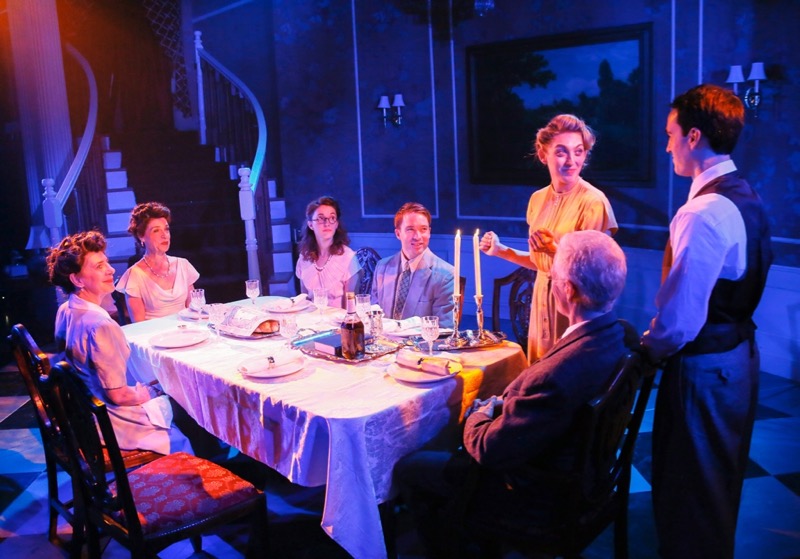
[caption id="attachment_52824" align="alignnone" width="800"] The cast in "The Last Night of Ballyhoo." Lenny Stucker photography.[/caption]
The cast in "The Last Night of Ballyhoo." Lenny Stucker photography.[/caption]
By Dawn Watson
Though it might seem like it sometimes, especially in the height of the summer season, the Hamptons didn’t invent class distinction. Elitism and social divisions have been around since before Biblical times.
[caption id="attachment_52826" align="alignleft" width="300"]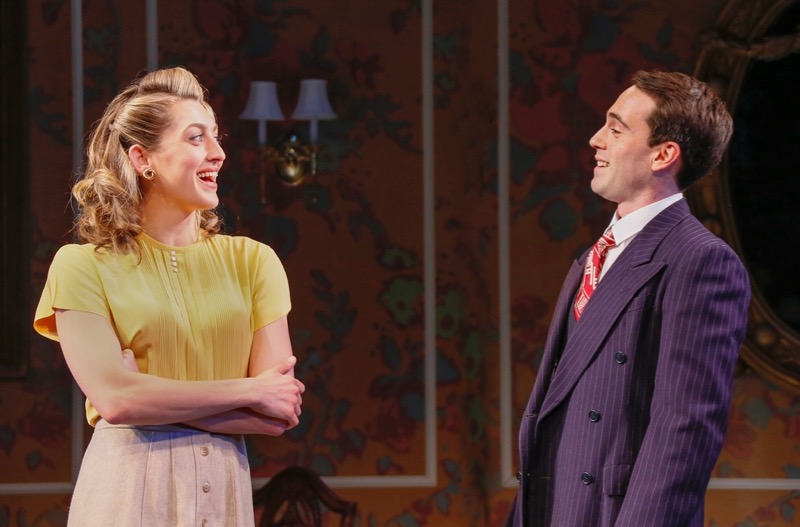 Amanda Kristin Nichols and Ari Brand in "The Last Night of Ballyhoo."[/caption]
Amanda Kristin Nichols and Ari Brand in "The Last Night of Ballyhoo."[/caption]
Growing up Jewish mid-century in Atlanta, Georgia, Pulitzer Prize, Tony- and Academy Award-winning playwright Alfred Uhry has seen his share of bias and discrimination. His experiences as both a Jew and son of the south have informed some of his best work about social standing, and racial- religious- and class division, which includes the play and film versions of “Driving Miss Daisy” and the comedy “The Last Night of Ballyhoo,” which is now staging at Bay Street Theater in Sag Harbor through Sunday, July 24.
Set in Atlanta in 1939 during the premiere of the film “Gone with the Wind,” the Tony Award-winning play presents a look into the lives of the upper-crust Freitag family members as they prepare for the social event of the year—a lavish German Jewish country club ball called “Ballyhoo.” Secure in their status, yet still overly concerned about appearances, the assimilated family takes great pains to make sure that they are seen as upstanding members of society. But all their pretense and posturing comes to light when college-age daughter Sunny Freitag gets romantically involved with Joe Farkas, an Eastern European Jew from Brooklyn.
[caption id="attachment_52825" align="alignright" width="300"]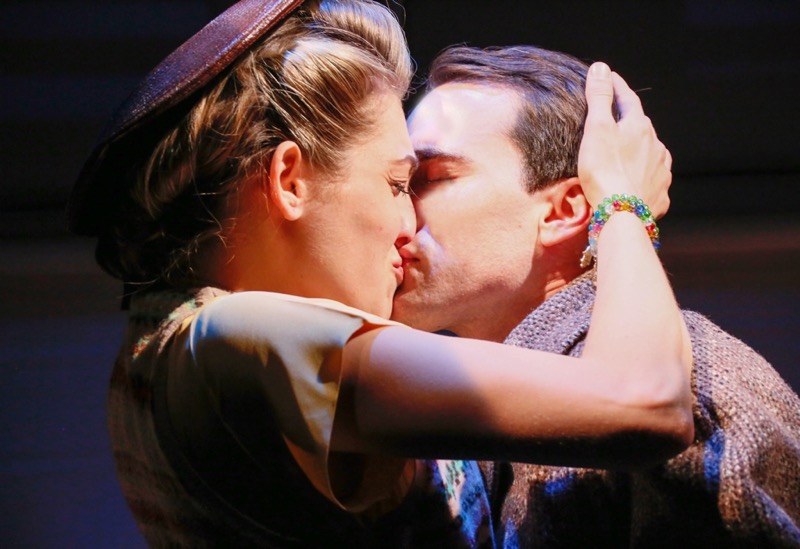 Amanda Kristin Nichols and Ari Brand in "The Last Night of Ballyhoo."[/caption]
Amanda Kristin Nichols and Ari Brand in "The Last Night of Ballyhoo."[/caption]
Sunny, a junior at Wellesley who is more interested in the works of Eugene Debs and Upton Sinclair than her Jewish identity, is nonetheless forced to take a few hard looks at herself and her beliefs as a result of the romance. Amanda Kristin Nichols, whose parents Barbara and Paul Kushner live in Southampton, relishes the role of the romantic lead, one of the biggest parts she’s gotten so far in her acting career.
“It’s been the greatest learning and growing experience for me,” she says, adding that “Ballyhoo” will complete her necessary requirements to earn her Equity card. “I’m so grateful for Bay Street and all the incredible talent in this show.”
[caption id="attachment_52823" align="aligncenter" width="800"]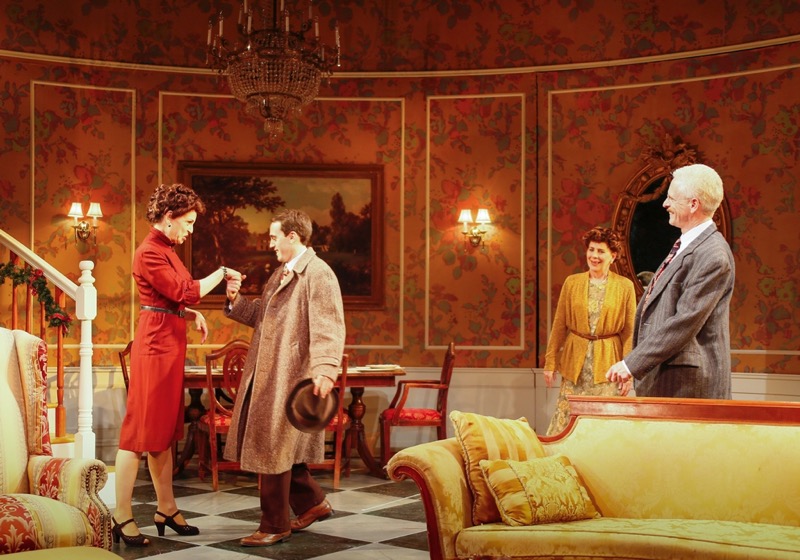 Ellen Harvey, Ari Brand, Dori Legg and John Hickok in "The Last Night if Ballyhoo."[/caption]
Ellen Harvey, Ari Brand, Dori Legg and John Hickok in "The Last Night if Ballyhoo."[/caption]
Directed by Will Pomerantz, Bay Street’s associate artistic director, the production is loaded with talent. The show, which he calls an “American classic,” also stars Ari Brand as Mr. Farkas, Daniel Abeles as Peachy Weil, Ellen Harvey as Boo Levy, John Hickok as Adolph Freitag, Dori Legg as Reba Freitag and Erin Neufer as Lala Levy. Behind the scenes, Tony-nominated set designer Alexander Dodge has created what will be the grandest design ever conceived and staged at Bay Street, according to Mr. Pomerantz. Rounding out the production team is lighting designer Mike Billings, costume designer Lindsay W. Davis, sound designer Jane Shaw, prop designer Andrew Diaz, hair/wig designer Meg Murphy, and production stage manager Kat West.
“It’s a good script, a wonderful play and all of the elements of the show are really coming together,” says Mr. Pomerantz. “It's very rare that you have a play like this that’s so well structured and masterfully written, plus a cast and crew that are at the top of their games too. It’s all come together like a piece of beautifully written and performed chamber music.”
The themes, and expert writing, are what initially drew Bay Street Artistic Director Scott Schwartz’s interest. The play’s message of understanding will resonate with audiences too, he says.
“We wanted to complement our season by doing a great contemporary play by a great American playwright,” he reports. “And ‘Ballyhoo,’ which is a delicious comedy with great characters, is about the exploration of American identity—what it means to hold true to our roots while being an American. Given the conversations that we’re having today, we thought that was something worth exploring.”
[caption id="attachment_52822" align="alignright" width="300"]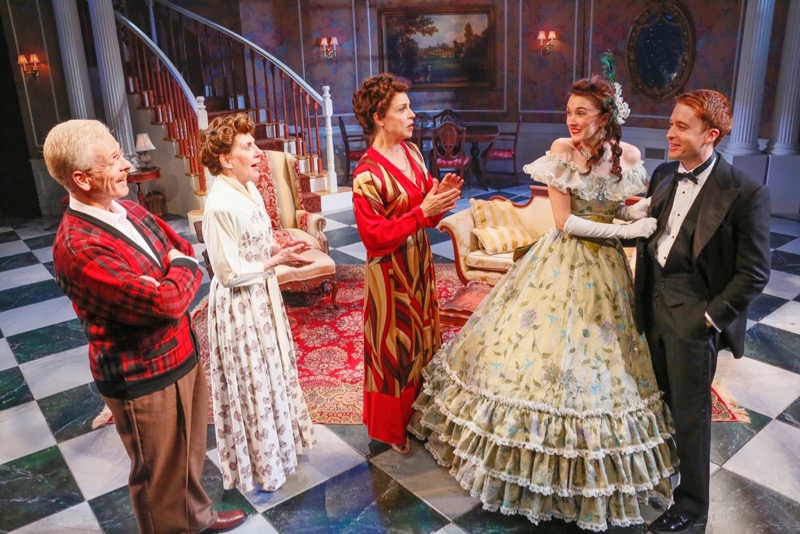 John Hickok, Dori Legg, Ellen Harvey, Erin Neufer, and Daniel Abeles in "The Last Night of Ballyhoo."[/caption]
John Hickok, Dori Legg, Ellen Harvey, Erin Neufer, and Daniel Abeles in "The Last Night of Ballyhoo."[/caption]
The appeal of the show is universal; not just for people interested in Judaism or even armchair social commentary, he adds.
“This is a great play for everybody,” says Mr. Schwartz. “It’s about how we relate to the larger social group within the class distinctions of our own. After all, everybody is interested in being a part of society.”
Mr. Pomerantz agrees.
“It resonates because it shows us how we look at differences. How everyone at one time has experienced that feeling of ‘the Other,” he says. “How we look outside ourselves and how we want others to perceive us.”
Similar to how “Driving Miss Daisy” opened viewers’ eyes about endemic racism, “Ballyhoo” expands the boundaries of our own perceptions about social class, even within our own specific circles, says Ms. Nichols. And it’s a good time too, she adds.
“At one point or another, every person has felt the sting of being labeled ‘less than,’ being excluded and the struggle to belong,” she says. “This play resonates because there’s so much humor and heart. It’s a real opportunity to come to the theater and not just be entertained but to also open up your heart and receive the message of acceptance.”
Bay Street Theater in Sag Harbor is staging “The Last Night of Ballyhoo” through Sunday, July 24. Student Sunday Matinees will be offered for high school and college students during the run of the show and Talkback Tuesdays will also occur with the cast and special guests, including Rabbi Daniel N. Geffen from Temple Adas Israel in Sag Harbor on Tuesday, July 5. For additional information and reservations, visit www.baystreet.org.